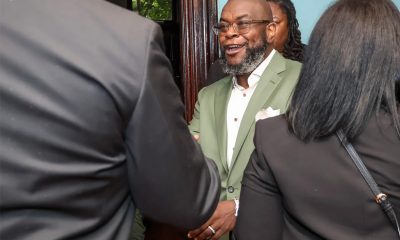Commentary
A second family in Dupont Circle
Morning coffee ritual fostered deep friendships

The holiday season brings home how lucky I am to have what I consider my second family, which is what I have come to think of my morning coffee group in Dupont Circle.
Some of us have been meeting every morning for more than 25 years. It began with four of us talking about the morning headlines over coffee before heading off to work or graduate school. The group has since grown to more than 20 and is open to all who enjoy early morning good conversation — at least sometimes it’s good — and want to share a bit of themselves.
Any member of the group who is in town knows they can always find others there seven days a week. Over the years, as the group has grown, it hasn’t changed all that much. Being in D.C. and in Dupont, we like to kid there is a great diversity of political views held by the members of the group; it ranges from A to C. While many of us have friends who are Republicans, I don’t remember any conservative Republican being a member of the group. They may find the conversation hard to take but of course would be welcome. We do have some very progressive members and others more moderate, but we tend to agree on the outcomes we want. Some strongly supported Bernie Sanders and others like me were die-hard Hillary supporters.
Today, quite a few members of the group are mostly retired, me being one of them. But years ago, before retirement, we were offended by a review of the coffee house posted on Yelp, which read: “I love my morning coffee place except for that loud group of Peter Rosenstein’s bloviating pensioners.” We took offense at that only because we weren’t yet pensioners when that was written; we accepted the bloviating appellation and have laughed about it for years.
The group today includes a college dean who joined the group while still a graduate student, a couple of retired members of Congress, a former solicitor general and former Cabinet member. This being D.C. we have our fair share of lawyers and some who work in the non-profit or association fields. While maybe half the group is retired those who still work do so in a variety of settings, including the State Department or other federal agency, law firms, and some for the District of Columbia. Among the members of the group there is a broad range of expertise in areas, including business, politics, finance, foreign policy, climate change, and healthcare. We even have a celebrated pastry chef as part of the group. Using that expertise and our connections we have often helped each other and friends advance in their careers.
We were concerned when the pandemic began our group would disband. We were not going to sit at the coffee house in the morning though some would walk there to get coffee and take it back home. Then one of our group offered to set up a Zoom call each day and for a year and a half, seven days a week, there would be between 10 and 20 people on the call at 8 a.m. each day. It was great as it included someone living in Mexico, he actually set up the call, another in North Carolina, another who was spending some during the pandemic in Hawaii and others in Vermont. As the pandemic eased and we all got vaccinated we began to return to the coffee shop and the Zoom calls ended.
As I said, it really is like a second family. Some of us go out to eat together regularly, we have traveled together, we have had theater parties and celebrate birthdays and births of kids and grandkids. A number of years ago 13 of us flew to Mexico to attend the destination wedding of two members of the group. If someone is ill you know there are people who will call and offer help. I was the recipient of that generosity and care a couple of years ago when I had surgery. Many years ago we even held a memorial service at the coffee shop for one of our members. It was the site of the kick-off for the political campaign for one of the early participants in the group.
I write this after being at our group’s holiday cookie party and then going to hear one of our group sing in his church choir. I can only wish that for everyone.
Peter Rosenstein is a longtime LGBTQ rights and Democratic Party activist. He writes regularly for the Blade.
Commentary
On this Transgender Day of Visibility, we can’t allow this administration to erase us
All people deserve to have our experiences included in the story of this country

By KELLAN BAKER | Since 2009, the world has observed Transgender Day of Visibility (TDOV) each March 31. The importance of ‘visibility’ feels especially significant this year, not only as a trans person but for me as a researcher whose career has been centered on equity and inclusion for transgender people. My work over the past 16 years, which has focused on advancing fairness, access, and transparency in health care for gender diverse populations, could not have prepared me for the speed and cruelty at which the Trump administration has worked to literally erase transgender people from public life.
From banning transgender people from serving openly in the military, blocking access to best practice medical care, and making it all but impossible for us to obtain accurate identification documents that match our gender, the impact of these attacks will be felt for years to come. As a scientist dedicated to fostering the health and wellbeing of diverse communities, I am particularly devastated by the intentional destruction of the federal research infrastructure and statistical systems that are intended to ensure the accurate and comprehensive collection of data on the full diversity of the U.S. population.
The importance of data cannot be understated. This makes the efforts by the federal government to remove survey questions, erase variables from key data sets, and stifle research even more alarming. By simultaneously removing access to existing datasets, removing gender (and other key measures, such as sexual orientation, race, and disability) from key surveys, terminating federal funding for research projects that include trans people, and censoring research projects at federal data centers, this administration’s goal is to erase the lived experiences of trans people – with the idea that if we don’t exist in data and in research, the federal government can claim that we don’t exist at all.
Just in the past two months, we’ve seen a rapid decimation of the inclusion of transgender people in federal research and their visibility in the federal statistical system.
Data sets that included gender measures have disappeared from federal websites. Critical data sets used by federal and state policymakers, public health staff, and researchers, such as the Youth Risk Behavior Surveillance System (YRBSS), were removed from the CDC website in response to a Trump executive order that made it the policy of the administration to recognize only two sexes, male and female. Although some datasets have been put back up, gender variables have been removed.
Surveys that had asked about gender identity no longer do. Claiming that the removal of gender identity measures from key national surveys such as the American Housing Survey, Household Pulse Survey, and National Health Interview Survey were “non-substantial,” the Trump administration has essentially skipped the extensive notice and public comment process that is required to make these types of changes—the same process that were used to add gender identity (and sexual orientation) measures.
In addition, attempts to exclude trans people and other communities facing disparities from surveys will result in a lack of large enough sample sizes to conduct quality data analysis, while reducing any chance of analyzing racial and ethnic differences among trans people.
Hundreds of grants supporting inclusive research have been terminated. The unprecedented move of the National Institutes of Health (NIH) to terminate research grants that include transgender people is just one example of this administration’s rush to eliminate funding from active scientific projects. In many cases, similar agencies are also now required to remove gender identity measures from federally supported surveys. Prominent trans health researchers have watched as their research portfolios are halted, work stopped, staff laid off, and participants left without care.
At the Institute for Health Research & Policy at Whitman-Walker, for example, we have already had seven studies terminated, with a financial impact that exceeds $3 million. One of these cancelled grants was a multi-year, longitudinal study in partnership with the George Washington University to explore the impact of structural racism and anti-LGBTQ bias on HIV risk among young queer and trans people of color nationwide. The notices of termination for this and other awards clearly spell out the administration’s disdain for groundbreaking research that seeks to understand and address health disparities related to LGBTQ populations, particularly trans people.
Censoring research. As seen with recent changes implemented by the CDC, the censorship of gender-related terms on federal websites and scientific publications is intended to further the erasure of evidence detailing the disparities faced by LGBTQ people.
On a day dedicated to honoring the lives and contributions of trans people, the impact that these egregious actions will ultimately have on the health and wellbeing of trans and nonbinary people is chilling. Without access to this knowledge, researchers will not be able to examine the repercussions of the harmful policies put forth by this administration and many states across the country, including bans and restrictions that negatively impact trans people’s physical and mental health, economic security, and educational outcomes.
Although there has been an effort by non-government entities to collect and store previously collected data prior to the Trump administration’s purges, state surveys, private research firms, and academics cannot fill the void left by the federal government’s decision to halt data inclusion. Ensuring that public entities and researchers can continue to use these datasets is only one piece of the puzzle being taken on by groups such as the Data Rescue Project and repositories like Data Lumos. Work also continues thanks to the efforts of the U.S. Trans Survey, the California Health Interview Survey (CHIS), and the important research and analysis of both Gallup and The Pew Research Center. Yet, gaps still exist due to threats of federal funding cuts to organizations committed to safeguarding inclusive data assets in the wake of the administration’s continued assault on trans rights.
This administration suggests that removing one of the only tools available for identifying an entire population of people is a “non-substantial” action. This not only questions the intelligence of the American people but is a direct insult to trans folks everywhere. All people deserve to be counted and to have our experiences included in the story of this country. Transgender people have always been a part of this country, and even if our nation’s surveys choose to exclude us, we continue to exist—authentically, unapologetically, and forever visible.
Kellan Baker, Ph.D., M.P.H, M.A., is executive director of the Institute for Health Research & Policy at Whitman-Walker.
Commentary
Children of American service members defend Pentagon DEI policies
Students protested Defense Secretary Pete Hegseth during Germany visit

“And a little child shall lead them.” (Isaiah 11:6)
Since the new U.S. Defense Secretary Pete Hegseth began his assault on diversity, equality, and inclusion in the U.S. armed forces, hundreds of students at U.S. military schools in Europe and Japan — the children of American servicemembers stationed overseas — have staged walkouts and other demonstrations to protest the new policies.
When Hegseth visited Stuttgart, Germany — the headquarters of U.S. European Command and U.S. Africa Command — on Feb. 11, more than 50 students from the Alexander Patch Middle School held the first of these protests when they left their classes and gathered in the school’s courtyard for an hour-long protest meeting.
More than a hundred students at the Nile Kinnick High School in Yokosuka, the children of Navy parents and Defense Department employees based at Yokosuka, Japan, the headquarters of the U.S. 7th Fleet, walked out of classes and held a protest in the school’s courtyard on Feb. 21, chanting and carrying banners.
“I love this school; I think one of its strengths is its diversity,” said Kinnick High School senior Chase Hassell, president of the student council and leader of the walkout. “I think we have such a great multicultural community, and I think that it’s important for the development of all children — not just us — to have experience with different people of different beliefs and backgrounds,” Hassell told Stars and Stripes after the demonstration.
And on March 6, hundreds of students participated in demonstrations at Humphrey High School at Camp Humphreys, South Korea, and at Ramstein High School and Kaiserslautern High School in Ramstein, Germany, and Wiesbaden High Schools in Wiesbaden, Germany, carrying signs that proclaimed “Solidary in Diversity,” “Censorship is Un-American,” “Our Classrooms Are Not Your Ideological Battleground,” “This Affects People of Color, LGBTQ+, Woman, and Everyone,” and “More Books, Less Bigots!”
There’s a great deal of anger around the country about what the Trump administration is saying and doing. But anger is not enough. These students are not just angry, they’re actually doing something to fight back. Maybe we all have something to learn from them.
Daniel Volman is the director of the African Security Research Project in Washington, D.C., and a specialist on U.S. national security policy toward Africa and African security issues.
Commentary
Survivors of sex crimes are unsung heroes
Taking trauma and turning it to their advantage

(Editor’s note: This is the second of a two-part story. Click here to read the first installment.)
Last month, I started watching “The X-files.”
For the most part I loved the show, with Agents Scully and Mulder as the primary reasons why. Yet what I found most frustrating was watching their investigations. As early as episode one, set in a small town of scared people guarded by scary men, Agent Scully proposed coincidences while Agent Mulder proposed aliens. Despite the episode having “cult” written all over it, both agents seemed none the wiser.
Recently, I learned the FBI has an open process for writers and other creatives to learn how the agency works. I also discovered the FBI has a history of monitoring writers. In fact, the FBI is about as image-conscious as your typical D.C. gay, making me wonder how the “X-Files” moved forward with little pushback. That’s about as interesting as UFOs being discovered in New Mexico as we tested the atomic bomb.
But if you’re reading this, you likely want me to shut up about the “X-Files” and get back to my story. When I left off, my friend had disappeared and my work cleared me of any wrongdoing. That said, I was mysteriously fired in September 2022—nearly a year after the initial incident—and just six weeks after my boss learned that I wrote books.
The process of my firing was strange, to say the least. First and foremost, I was never given a reason. To this day it remains a mystery. My now-former employer—a high-profile lobbying firm—then bullied me into signing an NDA to access my severance.
By the way, I negotiated up. While I don’t know what I did, I had a feeling I had that power. I was right.
Just prior to the firing, they asked me to bring in my laptop so they could download my files. This rang an alarm for me, primarily because they never gave me a laptop. So, they wanted me to bring in my personal laptop. As a writer with original materials, I reasonably asked what constituted a work file. I never received an answer.
Coincidentally, I met my ex-boyfriend exactly one week before I got fired. He is the same ex-boyfriend from my religion piece, in which I mentioned he fell into hard times. Specifically, I was referring to concerning signs I spotted last April, primarily on the gay apps, and with memories of the last boy still fresh on my mind, I refused to let another slip from my grasp.
So, what did I do? I dove headfirst into hell in a messy attempt to rescue him. After playing this new game of cat-and-mouse in which I was said mouse, allow me to share what I learned: Over the course of several months, I spotted sketchy characters at my ex’s place—characters I suspected dealt hard drugs, which was highly out of character for him. Moreover, I found online accounts promoting extremely suspect pornography and, yes, pimping services on X (formerly Twitter), some of which looked a lot like my ex. While I didn’t know what exactly was happening, I knew something was off, but when I confronted my ex, he denied it.
Being the stubborn asshole that I am, I decided to check these sketchy characters out for myself. It turns out I was spot on about their sketchiness. I learned they not only drug unsuspecting young men in a coordinated manner, but once drugged they sexually violate them and—if drugged enough—begin recording videos. It’s all made to look random yet safe; for example, there always seems to be a nurse in the group who is “experienced” in administering needles.
Once I had proof these people were unsafe, I took further action for my ex. In mid-November, I reached out to someone in his personal life, which was a tough decision since he was closeted. I was strategic and chose someone who knew he was bisexual, and after connecting with her on Instagram, spoke on the phone with her the next morning. Upon hearing my concerns, she agreed based on her own observations.
Apparently, she spotted signs of him being physically harmed over the summer. She and I spoke for hours on end about the situation and how we could help him. Then, just a week later, I lost contact with her and my ex. I haven’t heard from either since.
I eventually grew concerned enough to contact the police and the FBI. In the meantime, particularly following my trauma article, sex workers approached me to share their stories—primarily stories of rape and abuse alongside a power structure rooted in it. As for those who try to oppose this system? They’re often written off as mentally ill.
I don’t know about you, but I refuse to live in a world where young queers are shepherded into this system. That’s the opposite of what I envision for the queer community.
Mid-Atlantic Leather weekend arrived in January, along with more sex workers. Once again, some approached me to share their stories—about their aspirations, about their art, about their perspectives on the world. And once again, about the system of abuse designed against them from the start. I heard stories of young boys raped by their fathers, or friends of their fathers, or about the drugs used to coerce them into sexual activity. Sadly, just like a UFO witness, they are usually written off and never taken seriously, especially if they have a record of drug abuse or mental illness. Seems to be a pattern, doesn’t it?
That said, these men are not solely victims. If anything, they took their trauma and turned it to their advantage. I’d like to take this moment to thank them. They’re unsung heroes—each and every one—in a nation that often shames them.
Yet as proud as I am of these sex workers, my heart was equally broken. These stories were painful to hear, to say the least. I quickly grew paranoid of people around me, even friends at times. There were other times I sat alone in my apartment, bawling over the men I had lost, along with the pain others had experienced. This only strengthened my resolve to end it.
To top this all off, my final discovery came just two months ago. Turns out there’s an X account publicly teasing me about this entire affair. The account even references this column and, according to the receipts, started well before I noticed concerning signs about my ex in the first place.
Hello there, dear X account. It appears you’ve been observing me. Consider this my proverbial tapping back on the glass.
Wow—there seems to be a lot of time, energy, and effort spent on little ole me. Why is that, I wonder? I’ve mentioned before I’m just a measly little barback who has been fired twice. Although looking back, those firings were strange too, weren’t they?
Is it the abuse I uncovered? Is it the details of my lover’s past? Is it something I wrote? Is it a combination of the three? And is it possible that the little dark cloud that’s been following me in D.C. is more intentional than I once thought?
I may never learn the truth on my own, but I can pose another question: what’s the only thing scarier than UFOs? To me there’s just one answer: that UFOs were never real in the first place. Occasionally, answers to unsettling mysteries simply unearth more unsettling mysteries.
I mentioned before in this column that I arrived to D.C. naïve about the world, perhaps just as naïve as Agents Scully and Mulder. Yet in my naiveté I tripped on something: the rot hiding beneath the surface of our nation’s capital. No, it isn’t coincidence. It isn’t aliens, either. But whatever it is, I alone cannot identify it.
Throughout my time uncovering this story, I’ve come across friends, acquaintances, and even relatives who suffered abuse, along with threats or shaming to keep them quiet. They come from all races, creeds, backgrounds, and orientations, and as it turns out, some of the infrastructure of power in D.C. and in towns across this nation are built around it. While I’m ready to tear it down, this isn’t just my story. I might be the one starting it, but it’s not on me to finish.
The most I can do is hand the pen over to the victims. I’ve shared my part. Now it’s their turn. As for the audience: I hope you’re now ready to start believing.
Jake Stewart is a D.C.-based writer and barback.
-

 National2 days ago
National2 days agoDestination Tomorrow works to empower LGBTQ community
-

 Maryland2 days ago
Maryland2 days agoAt transgender visibility celebration, Moore called out for lack of action
-

 Arts & Entertainment2 days ago
Arts & Entertainment2 days ago‘Think of those who have not been seen,’ Cynthia Erivo’s powerful message at GLAAD Awards
-

 Opinions4 days ago
Opinions4 days agoHelping your company to be inclusive during hard times









